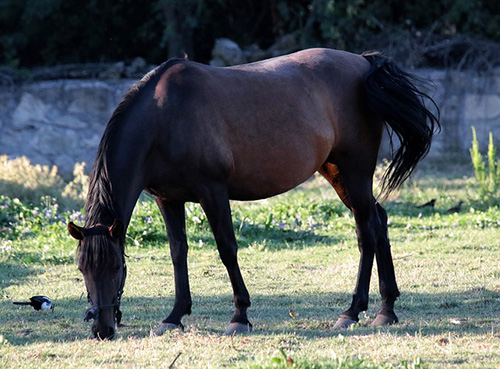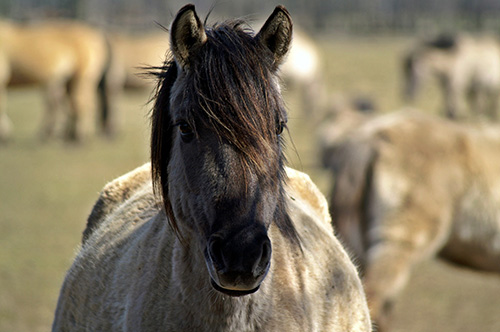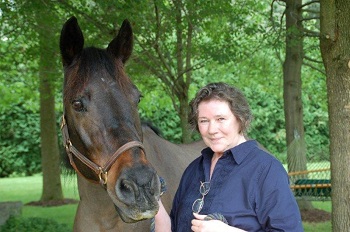
The pregnant mare has the same basic needs for water, nutrients and exercise, but with different targets.
The calories are the easy part. If you have a good quality hay (DE at least 0.9 Mcal/lb on hay analysis) she will need to eat only about 19 lb of hay/day in her 5th month, up to 24 lbs in the last month if her prepregnancy weight was 1100 lbs - and proportionately less or more if she is below or above that weight. This is definitely a reasonable consumption. If she won't eat that much, supplement her with a balanced commercial feed at the rate of 1 lb of feed for every 2.5 lbs of hay below her target intake.
Protein may be more problematic. She can still meet protein needs if the hay is at least 11% protein. This is possible but by no means guaranteed. If your hay is 8% protein instead of 11%, it is lacking 14 grams of protein per pound. For 20 lbs of hay that's about 280 g of protein.
If you are feeding grain instead of hay for part of the ration, there is also a protein deficiency. One pound of grain = approximately the calories of 2.5 pounds of hay. If the grain is 14% protein it supplies 64 g of protein. Even an 8% protein hay yields 91 g of protein in 2.5 pounds and at 11% it is 125 g compared to the 64 g in the grain.
The body makes proteins by stringing together amino acids. Essential amino acids are those that need to be adequate in the diet because the horse cannot make them. Lysine is the most important in pregnancy and supplementing at least 10 g/day is advisable, either as part of a protein supplement or separately if not supplementing protein.
Minerals are also extremely important. A diet that has adequate minerals for a nonpregnant horse is going to fall short. That mini horse the mare is creating contains and needs the same minerals as she does. Requirements for calcium and phosphorus to build bone are almost doubled by late pregnancy. Necessary increases in other minerals are not as well studied but they certainly exist. If you don't have hay/pasture analysis, use a full spectrum balanced mineral supplement that provides a minimum of 20 grams of calcium.
Special consideration should be given to copper and zinc. Although the NRC still hasn't fully accepted it, there is strong evidence that these two trace minerals play a key role in joint health in young horses. Supplements for the pregnant mare should have 200+ mg of copper.
If you are unsure about your mare's diet it's wise to get professional consultation. The extra effort in getting her nutrition right will pay obvious dividends in the foal.
Uckele, maker of CocoSoya, features formulas that support the pregnant mare.

Tri-Amino helps maintain strong muscles, healthy weight, and supports a healthy topline with the three most essential amino acids. Lysine aids in bone health and immune function. Methionine plays a role in the synthesis of structural proteins, especially hooves and connective tissues, and hair and mane coat. Threonine aids in healthy immune function.
Milk & Grow is formulated to meet the increased protein, vitamin and mineral demands of the pregnant and lactating mare and growing foal. Highly digestible protein supplement with favorable profiles for all the essential amino acids including the most often deficient amino acid, L-Lysine. Combined with a complete spectrum of vitamins, minerals, and Probiotics in an easy to feed, dust-free pellet.
Amino Fac supports the increased protein needs of growing horses, horses in training, and the pregnant mare to promote muscle integrity and definition. Concentrated source of all the amino acids, including 4% Lysine. Supports lean muscle mass, bone and joint structure, vital organ development, immune system function, and hoof and connective tissue health.

About Dr. Kellon - Dr. Eleanor Kellon, staff veterinary specialist for Uckele Health & Nutrition, is an established authority in the field of equine nutrition for over 30 years, and a founding member and leader of the Equine Cushings and Insulin Resistance (ECIR) group, whose mission is to improve the welfare of horses with metabolic disorders via integration of research and real-life clinical experience. Prevention of laminitis is the ultimate goal. www.ecirhorse.org.
Uckele Health & Nutrition, maker of CocoSoya, is an innovation-driven health company committed to making people and their animals healthier. On the leading edge of nutritional science and technology for over 50 years, Uckele formulates and manufactures a full spectrum of quality nutritional supplements incorporating the latest nutritional advances. www.uckele.com.
This article is published here with permission from Uckele. You can find Uckele in our section on Supplements.
You can find more informative articles in our section on Health & Education.

































